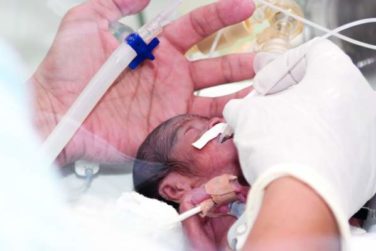Adolescent girls who reach puberty early and have inadequate parental supervision began drinking alcohol earlier and getting drunk sooner than their peers, forecasting further adjustment problems down the line, according to results of a new study.
“Adolescent alcohol consumption is not simply a matter of normative experimentation. Early adolescent drinking forecasts a host of long-term adjustment difficulties,” reported Daniel J. Dickson of Florida Atlantic University in Fort Lauderdale and his associates (Pediatrics 2015 Sep 21. doi: 10.1542/peds.2015-1258 ]).
“Practitioners presented with early-maturing girls may well consider advising parents about the unique risks confronting these children,” the authors wrote. “Heightened risks imply the need for heightened vigilance, and parents of early-maturing girls should be reminded that it is possible to project warmth and support, without retreating from supervision.”
Dickson’s team tracked 957 Swedish girls for 4 years, starting in their first year of secondary school (a mean 13 years old) and giving them surveys once a year regarding how often they had been intoxicated from alcohol and how much autonomy they perceived that their parents gave them. Previous research had already shown that inadequate supervision from parents increased the likelihood that adolescent girls would illegally consume alcohol.
They also assessed their first menarche. The 184 girls classified as early maturing got their first period before age 12 years. On-time maturing included the 587 whose first menarche was between ages 12 and 13, and late maturing included the 186 who first got their period after age 13 years.
As in past research, “higher initial levels of adolescent alcohol abuse corresponded with lower initial levels of autonomy granting,” but this association did not reach statistical significance, the authors found. However, there was a statistically significant association between poor parent supervision and increasing alcohol abuse among early-maturing girls. Alcohol abuse rates for early-maturing girls with the most freedom increased three times faster than for early-maturing girls with the least autonomy.
Further, “the higher the initial level of adolescent alcohol abuse, the greater the increase in autonomy granting” for early-maturing girls. Low levels of alcohol abuse from seventh to tenth grades involved a 12% increase in perceived parent autonomy granting; Medium levels led to an 18% increase, and high levels to a 24% increase.
Early-maturing girls tended to befriend older peers who also had high levels of alcohol abuse, and the association held after controlling for friends’ ages and alcohol abuse levels. The authors speculate that early-maturing girls experience more dissatisfaction with their appearance, more conflict with parents, and more depressive symptoms, leading to self-medication.
The research was funded by the Swedish Research Council, the Eunice Kennedy Shriver National Institute of Child Health and Human Development, the U.S. National Science Foundation, and the U.S. National Institutes of Health. The authors reported no disclosures.




